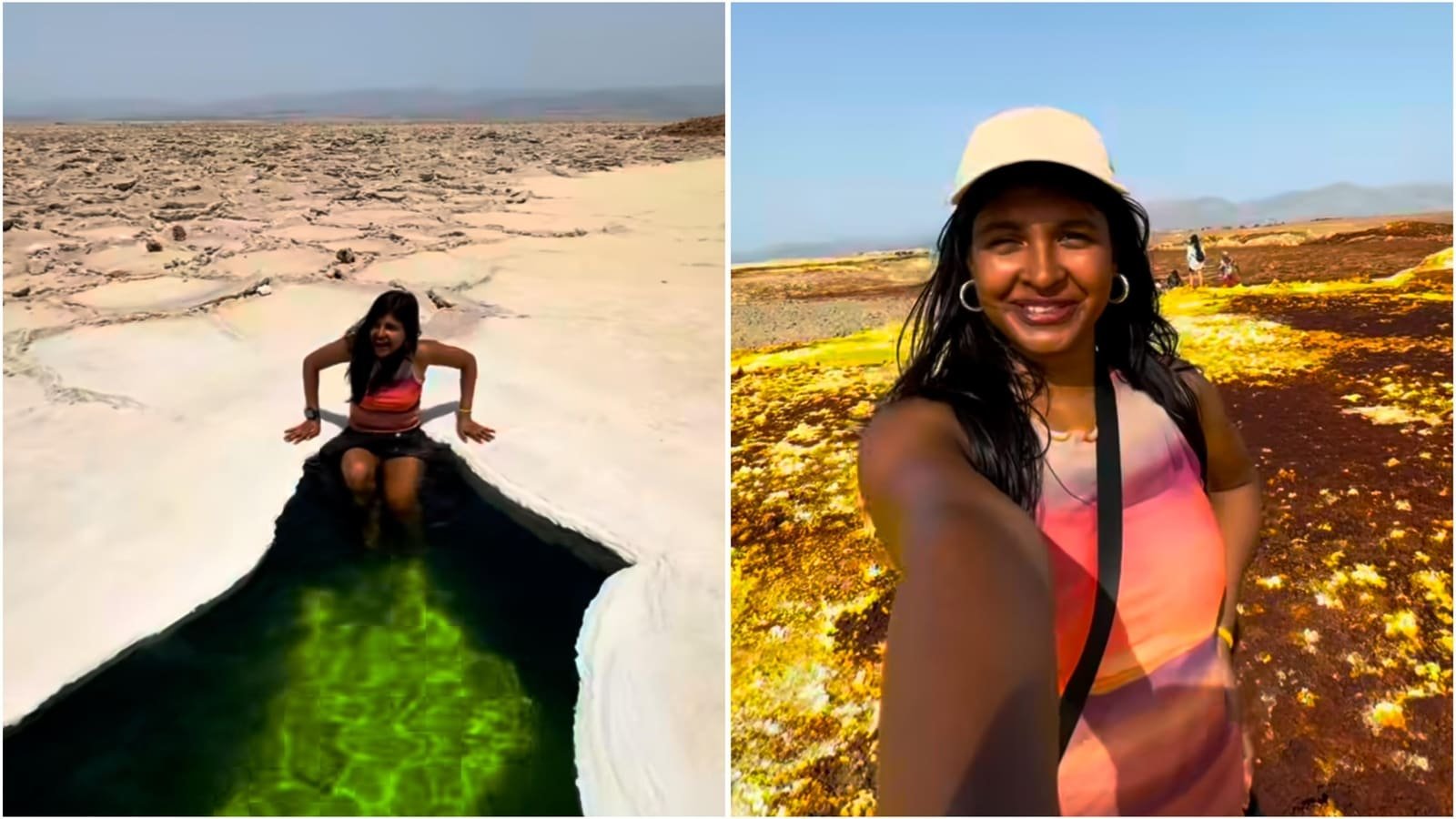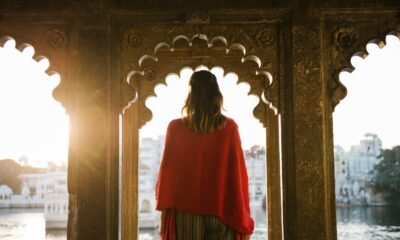Travel Guides & Articles
Travel vlogger visits earth’s hottest, driest and lowest place with alien-like terrain: ‘Smells like 1000 rotten eggs’ | Travel

Travel vlogger Vidya Ravishanker shares her experience visiting a scorching, barren landscape that holds the record for being the hottest, driest, and lowest place on earth. It’s a destination so extreme it can leave even seasoned explorers stunned. Let’s take a closer look at what it’s really like to visit such an unforgiving corner of the world. (Also read: ‘Lots of animals everywhere’: Travel vlogger shares 10 truths about India from her 6-week solo journey )
Inside world’s hottest, lowest and driest place
In her March 12 Instagram post, Vidya shares, “People call me crazy because I wilingly spent my money to be in one of the hottest, lowest and dryest place on earth. A place that’s home to sulphuric acid pools, endless stretch on salt deposits and an active volcano.”
The Danakil Depression lies at the junction of three tectonic plates, creating a hostile environment so intense that NASA scientists study it to understand how life might exist on Mars. But for Vidya, the severity of the conditions only made the journey more rewarding. “Despite its extreme conditions, it was one of my favourite travel adventures,” she shared.
About Ethiopia’s Danakil Depression
She further shared some facts about the Danakil depression in the caption, describing the region as an otherworldly dreamscape, with “alien hot springs in every colour imaginable” and acidic pools that literally bubble from the earth. “Yes, actual acid!” she exclaimed. The overpowering stench, which she compared to “1,000 rotten eggs,” was a small price to pay for the sheer spectacle. “You’ll be too busy picking your jaw up off the floor to care,” she added.
For those hoping to witness this geothermal wonderland at its most magical, Vidya had one key tip: “Go at sunrise. The light hits differently and makes everything look even more unreal.”
But she was quick to clarify that Danakil is far from a luxury retreat. “This isn’t your typical vacation spot,” she warned. With daytime temperatures reaching a blistering 50°C (122°F), no cell service, rough, unpaved roads, and spartan camping conditions, the journey is not for the faint-hearted. “Sleeping under the stars with Mother Nature as your washroom” is part of the experience, she noted.
‘Felt like another planet’
The landscape was so dramatic and unusual that it felt like stepping onto another planet. Vidya recalled endless salt flats that looked like untouched snow, the rhythmic movement of camel caravans led by salt miners at dawn, and the heart-stopping moment of watching molten lava bubble up from the Erta Ale volcano. She also highlighted the incredible resilience of the Afar people, the native community that has adapted to life in this extreme environment.
However, it was the Dallol region that left the most lasting impression. “Dallol though… that place lives rent-free in my head now. It’s like Mother Nature went on a trip and created this massive natural art installation. The colours are so wild, my photos look edited (they’re not!). Yellow, orange, green, red – all these toxic pools creating the most insane patterns I’ve ever seen,” wrote Vidya.
Finally, she offered a reality check for anyone inspired to follow in her footsteps. Expect to sweat in places you didn’t know could sweat, live with the smell of sulfur clinging to everything you own, and endure what she dubbed an “adventurous” stay. But despite all of that, Vidya promised, “It’s 100% worth it!”
Travel Guides & Articles
Kalka-Shimla toy train halted for third day due to rain; tourism and taxi sector hit | Latest News India

The iconic Kalka-Shimla toy train services remained suspended for the third consecutive day on Wednesday due to multiple landslides and track blockages caused by incessant rainfall across Himachal Pradesh, severely impacting the tourism and taxi business in the hill capital.
Continuous heavy rains for nearly a week have disrupted normal life in the state, blocking roads and damaging infrastructure. The Northern Railway has announced that all services on the UNESCO World Heritage narrow-gauge route will remain suspended until September 5 as engineers work to clear debris and repair damaged sections of the track, particularly near Datiyar in the Solan district, where a portion of the track has reportedly been washed away.
The suspension has hit local tourism-related businesses hard, especially during the monsoon season when many visitors prefer the toy train for its scenic yet relatively safe travel experience.
Luckey, President of the Taxi Union at Shimla Railway Station, told ANI that the halt in services has left many drivers struggling to make ends meet.
“The rain has caused a lot of trouble. Roads are blocked almost everywhere. Our business has been badly affected. The train was our only link, bringing in some tourists, but it has been closed for five days now. We are finding it hard to even cover our daily expenses,” Luckey said.
He added that while the Railway has officially notified suspension until September 5, the damage is extensive.
“They say landslides have occurred in multiple places and near Datiyar, the track itself is gone. Even here at the station, we have to leave our vehicles and walk to avoid damage, because trees are falling everywhere. Our livelihood was running only because of the train, but since it stopped, everything has come to a standstill,” he lamented.
Authorities have deployed teams to clear landslides and restore connectivity on the track, but with more rain forecast, the timeline for resumption of services remains uncertain.
The Kalka-Shimla toy train, built in 1903, a heritage train route is one of the region’s biggest tourist draws, offering panoramic views of the mountains, valleys, and colonial-era architecture. Its prolonged suspension during peak monsoon season is expected to cause further economic strain on those dependent on tourism in the city.
Travel Guides & Articles
India’s TBO to acquire Classic Vacations

India based travel distribution platform TBO has agreed to acquire Classic Vacations from Phoenix-based investment firm, The Najafi Companies.
The transaction value is estimated at up to $125 million.
The acquisition brings together TBO’s technology platform and worldwide inventory with Classic Vacations network of luxury travel advisors and suppliers.
Classic Vacations delivered revenue of $111 million and an operating EBITDA of $11.2 million in the fiscal year ended December 31, 2024.
“We’re thrilled to bring Classic Vacations into the TBO family – the company’s longstanding delivery of outstanding services has earned the trust of its more than 10,000 travel advisors in the U.S,” said Gaurav Bhatnagar, TBO’s co-founder and joint managing director.
“Classic Vacations is led by a strong team of experts and will continue as an independent brand.”
“As we start working on integrating Classic Vacations with TBO, we will remain open to similar strategic alliances going forward,” added Ankush Nijhawan, co-founder and co-managing director.
Melissa Krueger, CEO of Classic Vacations, added: “Together, we’re strengthening Classic Vacations’ position as the premier luxury partner in the market while extending our reach onto the global stage.”
Classic Vacations was bought by The Najafi Companies in 2021 from Expedia Group.
Classic Vacations has a large network of high-value travel advisors and deep ties with major American consortia.
It delivers premium service across hotels, air, experiences, car rentals, and travel protection, specializing in bespoke luxury itineraries.
Related News Stories: Partner News – TravelMole
Travel Guides & Articles
Govt allows select minorities to stay in India without passport

The Union Home Ministry on Monday, September 1, issued an order announcing that the government now exempts minority communities, namely, Hindu, Sikh, Buddhist, Jain, Parsi and Christian fleeing religious persecution from Afghanistan, Bangladesh, and Pakistan, who entered the country by December 31, 2024, without requiring valid passports or travel documents.
“A person belonging to a minority community in Afghanistan, Bangladesh and Pakistan, namely, Hindu, Sikh, Buddhist, Jain, Parsi and Christian, who was compelled to seek shelter in India due to religious persecution or fear of religious persecution and entered into India on or before the 31st December, 2024,” read the order from the home ministry.
Interestingly, the order did not name Muslims. This is in line with the BJP-led government’s Citizenship Amendment Act (CAA) that was passed in 2019 to facilitate this. It had le to severe protests from Muslims and other citizens who said the law is discriminatory in nature and that it can also be misused to disenfranchise Muslims in the country.
In fact, over the last few months the central government and BJP-led state governments have been targeting Indian Muslims from West Bengal who were being picked up on false allegations of being Bangladeshi citizens. Several prominent activists including Umar Khalid and Sharjeel Imam are currently in jail having spent nearly five years in prison on charges of inciting riots in Delhi amid the anti-CAA protests.
It was issued as part of a series of directives made public by the Union Home Ministry, under the newly enacted Immigration and Foreigners Act, 2025, which came into effect on Monday, September 1.
The Immigration and Foreigners Bill, 2025, aims to grant the Union government the power to control the entry and exit of individuals into and from India by regulations that outline requirements for travel documents, such as passports, and govern various aspects of foreign nationals’ stay, including visa rules, registration procedures, and other related matters.
Previously, the Citizenship Amendment Act (CAA), which was enforced last year, extended the eligibility for citizenship only to non-Muslim minorities from Afghanistan, Bangladesh, and Pakistan who entered India on or before December 31, 2014.
While the recent directive allows certain individuals to stay in India without documentation if they arrived by December 31, 2024, it doesn’t guarantee citizenship.
In contrast, the 2019 Citizenship Amendment Act offers a path to citizenship for persecuted non-Muslim minorities from Pakistan, Afghanistan, and Bangladesh who entered India before December 2014.
The CAA’s exclusion of Muslims sparked widespread protests and concerns about discrimination, secularism, and potential disenfranchisement.
-

 Business5 days ago
Business5 days agoThe Guardian view on Trump and the Fed: independence is no substitute for accountability | Editorial
-
Tools & Platforms3 weeks ago
Building Trust in Military AI Starts with Opening the Black Box – War on the Rocks
-

 Ethics & Policy1 month ago
Ethics & Policy1 month agoSDAIA Supports Saudi Arabia’s Leadership in Shaping Global AI Ethics, Policy, and Research – وكالة الأنباء السعودية
-

 Events & Conferences4 months ago
Events & Conferences4 months agoJourney to 1000 models: Scaling Instagram’s recommendation system
-

 Jobs & Careers2 months ago
Jobs & Careers2 months agoMumbai-based Perplexity Alternative Has 60k+ Users Without Funding
-

 Education2 months ago
Education2 months agoVEX Robotics launches AI-powered classroom robotics system
-

 Funding & Business2 months ago
Funding & Business2 months agoKayak and Expedia race to build AI travel agents that turn social posts into itineraries
-

 Podcasts & Talks2 months ago
Podcasts & Talks2 months agoHappy 4th of July! 🎆 Made with Veo 3 in Gemini
-

 Podcasts & Talks2 months ago
Podcasts & Talks2 months agoOpenAI 🤝 @teamganassi
-

 Education2 months ago
Education2 months agoAERDF highlights the latest PreK-12 discoveries and inventions









